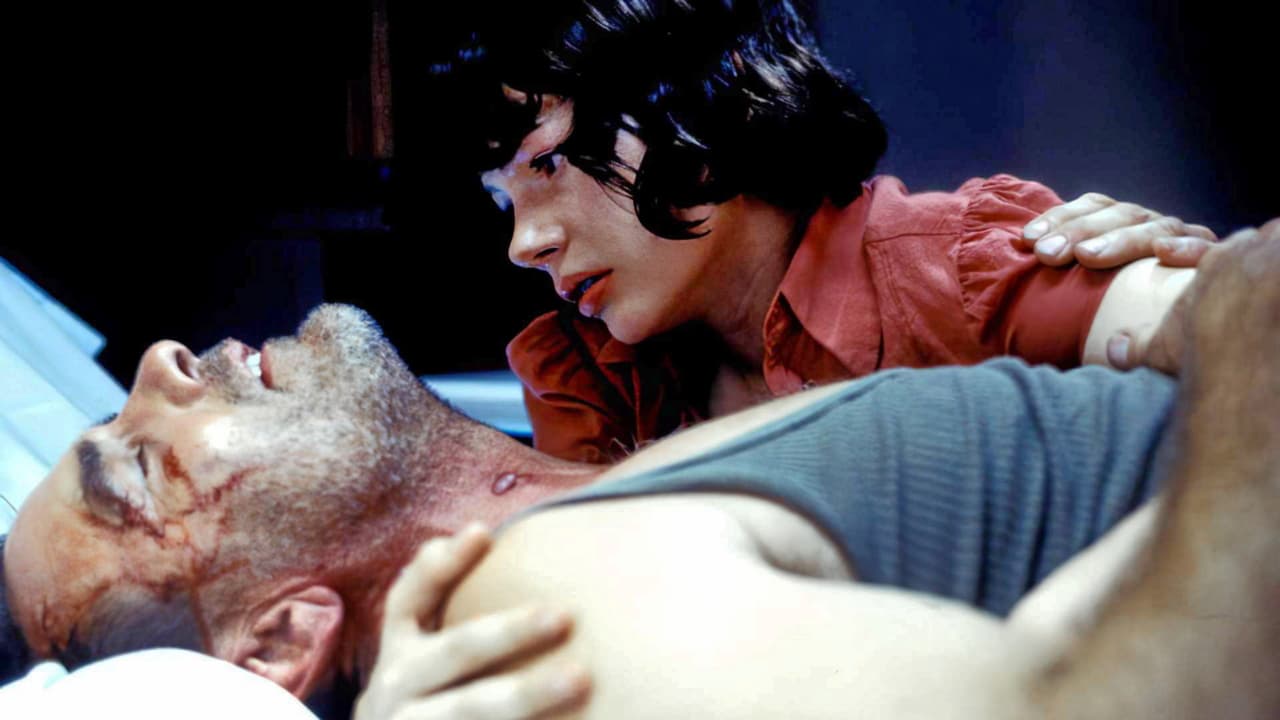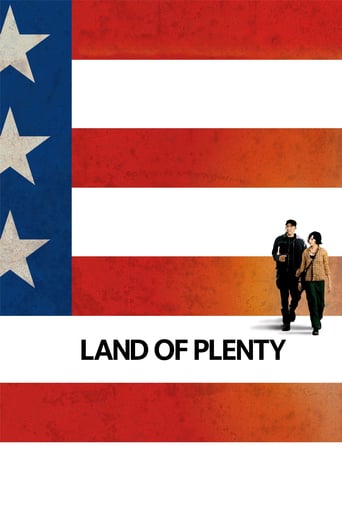



Sadly Over-hyped
Overrated
Horrible, fascist and poorly acted
From my favorite movies..
Wim Wenders' "Land of Plenty", a loose sequel to his underrated "The End of Violence", stars Michelle Williams as Lana, a young woman who has returned to the United States after working as a missionary abroad. After leaving behind the war torn borders of Palestine and Israel, she is shocked to find America in a similar state. "Welcome to the hunger capital of America," a pastor, played by "The Wire's" Wendell Pierce tells her, referring to the slums of downtown Los Angeles.Penniless, but armed with her winning optimism and the fearlessness of youth, Lana begins serving the pastor's Mission, helping the poor and handing out food to the homeless. It's a drop in the ocean, but she does it nonetheless.The film takes place in the wake of the 9/11 attacks, and paints a landscape of fear, paranoia, poverty, alienation, misguided aggression, dispossession and hopelessness. While America's war machine – sold to the public as a Christian Crusade - gears up to bulldoze the Middle East, at home people suffer. In this dour world, Lana's character is the only bright light. Contrasted to her angelic, graceful, almost saintly acts, are the actions of her uncle Paul, played unconvincingly by John Diehl. Paul, a symbol of right-wing, warmongering power-figures like Dick Cheney and George Bush, is a Vietnam veteran who spends his days roaming the streets in a surveillance van, illegally spying on others, disregarding murderous Humvee drivers and stalking anyone with a beard. He's an obsessive patriot on a mission from God: to protect the Land of the Free from Ay-rabs and terrorism. At night he has nightmares. Vietnam still scars his psyche.Note that while Paul echoes illegal spy programs like PRISM, MSUCULAR and ECHELON, he also recalls both the "angels" of Wenders' previous films, and the demented national surveillance crews of "End of Violence". It's a neat shift, compassion dovetailing into outright fascism. Regardless, the film draws very simple parallels between Lana and Paul. "Lana has a very innocent, almost childlike faith in God and the power of love," Wenders himself says, "whereas Paul is not really a spiritual person. His religion is America. And America over the last few years has become very similar, in that nationalism has become a kind of religion. It's almost as though Christianity these days can only become defined by certain right-wing politics." So at its core the film is concerned about the perversion of Christian values. Wenders paints a land of plenty where the poor are routinely exploited whilst Christian hallmarks are perverted by administrations to make subjugation, foreign and state-side, all the more palatable. Like Paul, the US sees itself as a country under siege while ignoring all the deeper problems closer to home.Unsurprisingly, the film ends with Lana teaching her uncle to love and let go of his anger, whilst Paul himself must confront the fact that the suspicious "Arabs" he stalks and bullies are just innocent guys going about their business. The film is very very reductive, politically, philosophically and ideologically naive, wrestling superficially with questions greater artists themselves struggle to unravel, but Wenders, himself a devout Christian, seems to know this: "In order to make people identify fully with a character you have to stay in a traditional narrative," he says. "I needed a linear narrative to say what I needed to say in this film." What he's really doing is making a modern version of Dreyer's "The Passion of Joan of Arc", where a young woman's tortured, wide eyed, steadfast faith in God is designed to touch the hearts of we the audience. The film's political baggage and Bush bashing are almost besides the point. Like Dreyer did with Maria Falconetti, the film is designed around Michaelle William's radiant but wounded eyes, and the near-monastic cut of her hair. It's about Williams expressive face, specifically the doubts, fears, loneliness and anxieties hidden almost imperceptibly behind her optimistic outer facade. The question is whether her faith in humanity is enough, whether her radiance will fade with age, or whether, like Joan of Arc, she's destined to be crushed.The film was written quickly, and shot in 16 days on a minuscule budget using the Panasonic DVX100, a cheap digital camera. To date it's the best film shot using the DVX100, a camera which was once touted as the saviour of independent film, before being quickly supplanted by HD. The digital look of Wenders' film creates an intimate, warm environment, as well as a sense of immediacy. Wenders has always been adept at bringing the insights of an outsider to bear on the American experience. "Plenty" echoes some of his previous films - "The American Friend", "Vilence", "The Sate of Things" and "Paris Texas" - but carries with it a greater sense of urgency.8.5/10 – Michelle Williams and the always likable Wendell Pierce turn in very good performances. John Diehl is not convincing, perhaps because his character was conceived as a raging caricature. The film hinges, I think, on a familiarity with Dreyer's "The Passion of Joan of Arc". Ignore the film's politics; it's all about Lana's face. Worth one viewing. Makes a good companion-piece to "Wendy and Lucy" and "35 Shots of Rum".
View Morehttp://eattheblinds.blogspot.com/There isn't too much to like about Wim Wenders' films over the last twenty years. There have been a few bright spots, but for the most part, Wenders' obsession with America has gotten the worst of him. In his prime, few directors since Antonioni were as adept at depicting inner monologues through silence. Wenders' characters were complicated men of few words.Over time Wenders love affair with America somehow convinced him that the 'less is more' approach was failing. Wenders threw his greatest strength out the door and substituted it with what would become, over time and many films, his achilles heel: big ideas.The characters in Land of Plenty aren't really individual people, they are ideas. These characters represent something grander, something excruciatingly ambitious: the American conscience. Lofty goals of this sort often end up as preachy and pretentious and LOP's screenplay is just that. Shot on the cheap, on digital video, LOP feels like noble idea rushed into production without the benefit of enough revisions to weed out the heavy handedness. Films concerned with the traumatic effects of 9/11 are compelled to be both profound and reverential, the problem is profound and reverential seldom make for a worthwhile movie going experience. If there was a rating system based on the number of American flags displayed in a movie, LOP would score full points, as it is, LOP rates very low.
View MoreLand of Plenty is about an Viet Nam Vet looking for terrorists around every corner. His naive niece from Palestine visits at the behest of her dead mother to get an education about America and Americans. The majority of the film is about the vet imagining all kinds of terrorist plots as he goes from place to place in LA following people and making all kinds of assumptions to support his neurosis brought on by agent pink which was the precursor to agent orange. The niece learns that America is a land of plenty that not everyone gets a piece of as she takes up residence in a mission while looking for her uncle. A drive by shooting of a homeless Pakistani brings them together as she looks for the next of kin and he looks for the terrorist cell. Upon meeting the Pakistani relative, they come to the realization that while America is a great country, the real America is not the stuff of legend, it is the struggle of its people to make their way through their lives and through the world.
View MoreThe End of Violence and certainly the Million Dollar hotel hinted at the idea the Wenders has lost his vision, his ability to tell compelling stories through a map of the moving picture. The Land of Plenty seals the coffin, I'm afraid, by being a vastly unimaginative, obviously sentimental and cliché'd film. The characters are entirely flat and stereotyped, the writing, plot and direction are amateurish, at best. For the first time in quite a while, I was impatient for the film to end so I could get on with my life. The war-torn delirium of the uncle, the patriotic abstract gazing at the sky at the conclusion...it all just struck me as being so simple and pathetic, hardly the work of a filmmaker who once made some compelling magic on screen. What happened? The days of experimentation, perceptive writing and interesting filming possibilities are long behind him, I'm afraid. Let's hope he finds his inspiration again... At the Toronto film festival, which is where I saw the film, Wenders was there to introduce it. Completely lacking in humility, he offered us the following: "I hope...no, wait...I KNOW you're going to enjoy the next two hours." I'm afraid he couldn't be more wrong...
View More